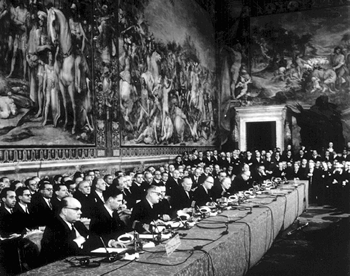
Mar 25, 2017 | Focolare Worldwide
 What Europe should be United Europe is another step towards a united world. It is a step forward and an achievement under the pressure of popular requests, natural rights, Christian revelation, moral and spiritual forces, with the addition of economic and political, and scientific and technological pressure. All these propel towards unification, the final evolution of reason and morals, of life in time and in eternity. For Clement of Alexandria – heir of Greek wisdom – unity is the good, and producer of life; division is the evil and generator of death. Civilisation grows proportionately with how much it unifies people. For Huxley, every new progress of civilisation is a progress in charity, which is the sentiment which tends to make everyone one. It is no wonder since it is the soul of Christ whose testament ended in the vow: «so that all may be one.» Charity leads to integration, communion, and solidarity, also in politics and economy. And here, between the essential forces that press toward European integration, we want to illustrate the forces of the spirit, leaving it to illustrate the political, economic, and social aspects, etc. Igino Giordani, «Fides», May 1961, p.130 Christianity and Europe Europe is full of resentment like a storage of explosives, kept alive by philosophies and false patriotisms, mythologies and egoistic interests. In order not to explode, Europe needs to remove all this inflammable material. It needs a universal reconcilement, which could free it from the past so it could look to the future. Whoever will carry out «this ministry of reconciliation?» It is Christianity: this well of sanctity, which Europe still guards and still communicates to other continents. And Christianity implies a unification in freedom and peace, with the elimination of wars and other reasons for friction. Igino Giordani, «Fides», May 1961, p.131 The soul of Europe Europe already has a soul: Christianity, its essence and its genesis. In this common spiritual breath, also the material and human factors blend and arise, vivifying themselves with a universal ideal. And so the peoples of Europe, upon reviving these principles at the base of their history, melting them in the ideal flame of solidarity, the fruit of love – which is divine intelligence – will find in its rationality, coexistence, urgency and need of it, the solution, firstly to their problems. This is the a decisive moment, in which an internal war – which today more than ever before, appears irrational and fratricide – could mark the definitive catastrophe. Love instead, putting the good in circulation, will be able mark the final salvation. Igino Giordani, «Fides», May 1961, p.131
What Europe should be United Europe is another step towards a united world. It is a step forward and an achievement under the pressure of popular requests, natural rights, Christian revelation, moral and spiritual forces, with the addition of economic and political, and scientific and technological pressure. All these propel towards unification, the final evolution of reason and morals, of life in time and in eternity. For Clement of Alexandria – heir of Greek wisdom – unity is the good, and producer of life; division is the evil and generator of death. Civilisation grows proportionately with how much it unifies people. For Huxley, every new progress of civilisation is a progress in charity, which is the sentiment which tends to make everyone one. It is no wonder since it is the soul of Christ whose testament ended in the vow: «so that all may be one.» Charity leads to integration, communion, and solidarity, also in politics and economy. And here, between the essential forces that press toward European integration, we want to illustrate the forces of the spirit, leaving it to illustrate the political, economic, and social aspects, etc. Igino Giordani, «Fides», May 1961, p.130 Christianity and Europe Europe is full of resentment like a storage of explosives, kept alive by philosophies and false patriotisms, mythologies and egoistic interests. In order not to explode, Europe needs to remove all this inflammable material. It needs a universal reconcilement, which could free it from the past so it could look to the future. Whoever will carry out «this ministry of reconciliation?» It is Christianity: this well of sanctity, which Europe still guards and still communicates to other continents. And Christianity implies a unification in freedom and peace, with the elimination of wars and other reasons for friction. Igino Giordani, «Fides», May 1961, p.131 The soul of Europe Europe already has a soul: Christianity, its essence and its genesis. In this common spiritual breath, also the material and human factors blend and arise, vivifying themselves with a universal ideal. And so the peoples of Europe, upon reviving these principles at the base of their history, melting them in the ideal flame of solidarity, the fruit of love – which is divine intelligence – will find in its rationality, coexistence, urgency and need of it, the solution, firstly to their problems. This is the a decisive moment, in which an internal war – which today more than ever before, appears irrational and fratricide – could mark the definitive catastrophe. Love instead, putting the good in circulation, will be able mark the final salvation. Igino Giordani, «Fides», May 1961, p.131
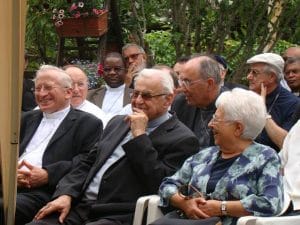
Mar 18, 2017 | Focolare Worldwide
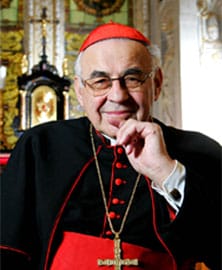 As a child, he dreamt of being a pilot, but an attraction to the priesthood stuck with him from the time he was eleven. He was born on May 17, 1932 in Lisnice, the Province of Pisek in Southern Bohemia. From 1952 to 1953 he was a worker. In 1960, following his graduation, he worked as an archivist but soon abandoned that occupation to study theology. In 1968 he was ordained to the priesthood. During a visit to East Germany in the 1960s, he met a layman and some priests who were living the spirituality of the Focolare Movement. He was taken by the presence of Jesus among this group of Christians, a presence that He promises when two or more are united in His name (see Mt 18:20). That experience of communion would accompany him for the rest of his life. His pastoral work in Ceské Budejovice annoyed the Communist State system, and in 1971 he was transferred to a parish in Selva Boema. Seven years later, because of his popularity especially among young people, his permission to carry out his priestly ministry was revoked. “I lost my license. I can’t say mass anymore,” he explained to his parishioners. “I preached and talked about the cross and recommended that we carry it; now is the moment for me to carry it.” Officially returned to the lay state, Chiara Lubich accepted his request to enter the focolare in Prague that was opened in 1981. He found a job as a window-washer that lasted for 10 years. He would often say: “I can’t preach or share the sacraments in public, but when I look at the cross I realize that Jesus who is the one and only High Priest could hardly even talk when he was on the cross, and his hands were nailed in. I became convinced: ‘Now, you’re close to the High Priest’ and I embraced Jesus Forsaken. It was the spirituality of the Focolare that guided me in this direction. I felt the power of which Isaiah 53 speaks: ‘The man of suffering’ (…) I lived for a long time of this light: everything that was ugly could serve for my edification. I realized, without exaggerating, that those ten years of washing windows had been the most blessed years of my life.” He would often repeat: “I hold it to be a miracle that God spread the spirituality of unity in the Socialist world where everything was under surveillance. He always knows the ways in.”
As a child, he dreamt of being a pilot, but an attraction to the priesthood stuck with him from the time he was eleven. He was born on May 17, 1932 in Lisnice, the Province of Pisek in Southern Bohemia. From 1952 to 1953 he was a worker. In 1960, following his graduation, he worked as an archivist but soon abandoned that occupation to study theology. In 1968 he was ordained to the priesthood. During a visit to East Germany in the 1960s, he met a layman and some priests who were living the spirituality of the Focolare Movement. He was taken by the presence of Jesus among this group of Christians, a presence that He promises when two or more are united in His name (see Mt 18:20). That experience of communion would accompany him for the rest of his life. His pastoral work in Ceské Budejovice annoyed the Communist State system, and in 1971 he was transferred to a parish in Selva Boema. Seven years later, because of his popularity especially among young people, his permission to carry out his priestly ministry was revoked. “I lost my license. I can’t say mass anymore,” he explained to his parishioners. “I preached and talked about the cross and recommended that we carry it; now is the moment for me to carry it.” Officially returned to the lay state, Chiara Lubich accepted his request to enter the focolare in Prague that was opened in 1981. He found a job as a window-washer that lasted for 10 years. He would often say: “I can’t preach or share the sacraments in public, but when I look at the cross I realize that Jesus who is the one and only High Priest could hardly even talk when he was on the cross, and his hands were nailed in. I became convinced: ‘Now, you’re close to the High Priest’ and I embraced Jesus Forsaken. It was the spirituality of the Focolare that guided me in this direction. I felt the power of which Isaiah 53 speaks: ‘The man of suffering’ (…) I lived for a long time of this light: everything that was ugly could serve for my edification. I realized, without exaggerating, that those ten years of washing windows had been the most blessed years of my life.” He would often repeat: “I hold it to be a miracle that God spread the spirituality of unity in the Socialist world where everything was under surveillance. He always knows the ways in.” 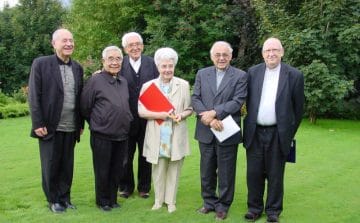 With the Velvet Revolution in 1989 he became pastor again. In 1990 he was named bishop of Ceské Budejovice and, in the following years, Archbishop of Prague. From 1992 to 2000 he guided the Czech Bishops Conference and from 1993-2001 becamse President of the Council of the Bishops Conferences of Europe. On November 26, 1994, he was created cardinal. Following the death of Bishop Klaus Hemmerle in January 1994, who began the branch of the Bishop Friends of the Focolare Movement, the foundress invited Archbishop of Prague to assume the role as moderator of that branch of the Movement. He succeded Bishop Hemmerle who had been a great theologian and charismatic figure. It seemed too demanding to him, but Chiara Lubich assured him: “Don’t be afraid, Your Emminance, you won’t be alone. You’ll go ahead as a body.” The cardinal carried out this task for 18 years, convoking and supporting numerous international meetings of bishops from both the Catholic and other Churches, which were held in Castel Gandolfo, Italy, Istanbul, Jerusalem, Beirut, Augsburg, Wittenburg, London, Geneva, El Cairo, just to name a few.
With the Velvet Revolution in 1989 he became pastor again. In 1990 he was named bishop of Ceské Budejovice and, in the following years, Archbishop of Prague. From 1992 to 2000 he guided the Czech Bishops Conference and from 1993-2001 becamse President of the Council of the Bishops Conferences of Europe. On November 26, 1994, he was created cardinal. Following the death of Bishop Klaus Hemmerle in January 1994, who began the branch of the Bishop Friends of the Focolare Movement, the foundress invited Archbishop of Prague to assume the role as moderator of that branch of the Movement. He succeded Bishop Hemmerle who had been a great theologian and charismatic figure. It seemed too demanding to him, but Chiara Lubich assured him: “Don’t be afraid, Your Emminance, you won’t be alone. You’ll go ahead as a body.” The cardinal carried out this task for 18 years, convoking and supporting numerous international meetings of bishops from both the Catholic and other Churches, which were held in Castel Gandolfo, Italy, Istanbul, Jerusalem, Beirut, Augsburg, Wittenburg, London, Geneva, El Cairo, just to name a few.  The membership of the Bishops in the Work of Mary is entirely spiritual and does not interfere in any way with their duties as bishops, as established by the Church. They find that the spirituality of unity is “in profound harmony with the episcopal charism. It reinforces the effective and affective collegiality and unity with the Holy Father, among the bishops, and helps them to actualize the teachings of the Second Vatican Council on the Church-Communion.” This is written in their rule of life for the “Bishop Friends of the Movement” which was recognized by John Paul II and approved by the Pontifical Council of the Laity in a letter dated February 14, 1998. Also the heads of several other Christian Church’s have expressed their appreciation for this initiative. See also: News.va – Telegram of condolences for the death of Cardinal Miloslav Vlk
The membership of the Bishops in the Work of Mary is entirely spiritual and does not interfere in any way with their duties as bishops, as established by the Church. They find that the spirituality of unity is “in profound harmony with the episcopal charism. It reinforces the effective and affective collegiality and unity with the Holy Father, among the bishops, and helps them to actualize the teachings of the Second Vatican Council on the Church-Communion.” This is written in their rule of life for the “Bishop Friends of the Movement” which was recognized by John Paul II and approved by the Pontifical Council of the Laity in a letter dated February 14, 1998. Also the heads of several other Christian Church’s have expressed their appreciation for this initiative. See also: News.va – Telegram of condolences for the death of Cardinal Miloslav Vlk
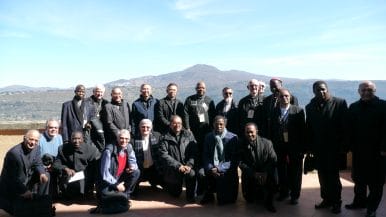
Mar 18, 2017 | Focolare Worldwide
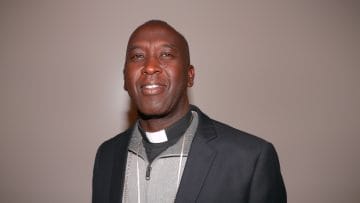 Our diocese of Lodwar – Bishop Dominic Kimengich recounts – is situated in Turkana County (Kenya), bordering with Uganda, South Sudan and Ethiopia. It is 700 km away from Nairobi. The travelers who come to us have to ensure that there is a police escort along the route, so as not to encounter bandits and robbers in the frequent raids. Due to climactic changes, it has not rained for a long time, with the terrible consequence of the shortage that has affected the entire Turkana area. Sixty percent of the population still live the nomad lifestyle and up to now have survived by raising camels, sheep, goats, donkeys and cattle. Now that there is no food or pastures for the cattle, they are forced to migrate to nearby countries. Given that this is a zone of confines, the many conflicts between bordering tribes battling for survival provoke the death of many innocent people, among which are women and children. In the diocese we have a huge refugee camp called Kakuma, with almost 200,000 refugees coming mostly from South Sudan, where the situation is worsening each day. But many also come from Somalia. We find ourselves in a very difficult situation since not even the inhabitants of Lodwar have enough food and water. Many children have even stopped going to school for lack of food. In 1985 when I was in the seminary, someone told me about the Focolare spirituality, but once a priest I was assigned to a parish where it was difficult to keep in contact with the Movement. It was only when I became a Bishop that I was able to attend some meetings in Nairobi. In 2012, to celebrate the 50th year of evangelisation, we thought of inviting the bishops of the surrounding dioceses: Uganda, South Sudan, Ethiopia and other four dioceses in Kenya, to speak about peace and reflect on what we can do. Ten Bishops attended and we got together for three days, a meeting which is now held every year. We can say that every time we would meet, the conflict was reduced. Once I went to visit Bishop Markos of Ethiopia, who is also present in this congress and from the unity built also with the other bishops, we find the strength to bring ahead our ministry in such a troubled land.
Our diocese of Lodwar – Bishop Dominic Kimengich recounts – is situated in Turkana County (Kenya), bordering with Uganda, South Sudan and Ethiopia. It is 700 km away from Nairobi. The travelers who come to us have to ensure that there is a police escort along the route, so as not to encounter bandits and robbers in the frequent raids. Due to climactic changes, it has not rained for a long time, with the terrible consequence of the shortage that has affected the entire Turkana area. Sixty percent of the population still live the nomad lifestyle and up to now have survived by raising camels, sheep, goats, donkeys and cattle. Now that there is no food or pastures for the cattle, they are forced to migrate to nearby countries. Given that this is a zone of confines, the many conflicts between bordering tribes battling for survival provoke the death of many innocent people, among which are women and children. In the diocese we have a huge refugee camp called Kakuma, with almost 200,000 refugees coming mostly from South Sudan, where the situation is worsening each day. But many also come from Somalia. We find ourselves in a very difficult situation since not even the inhabitants of Lodwar have enough food and water. Many children have even stopped going to school for lack of food. In 1985 when I was in the seminary, someone told me about the Focolare spirituality, but once a priest I was assigned to a parish where it was difficult to keep in contact with the Movement. It was only when I became a Bishop that I was able to attend some meetings in Nairobi. In 2012, to celebrate the 50th year of evangelisation, we thought of inviting the bishops of the surrounding dioceses: Uganda, South Sudan, Ethiopia and other four dioceses in Kenya, to speak about peace and reflect on what we can do. Ten Bishops attended and we got together for three days, a meeting which is now held every year. We can say that every time we would meet, the conflict was reduced. Once I went to visit Bishop Markos of Ethiopia, who is also present in this congress and from the unity built also with the other bishops, we find the strength to bring ahead our ministry in such a troubled land.  Here in Castel Gandolfo it’s so wonderful to be able to share our own experience with bishops of the whole world and together go deeper into the charism of unity, which teaches us in a practical way on how to live – also as bishops – a genuine love in the spirit of fraternity. Participating in this Congress was a big testimony of God’s love for me and of how He wants us to love one another as Jesus loved us. The theme chosen for this year is greatly in line with the reality of my life and of the territory I come from. It is only seeing things from the point of view of Jesus crucified and abandoned that we can hope in a world where people can learn to live in peace, sharing what they have up to the point of embracing one another as sons of the same God the Father. As I prepare to return to my diocese I can testify with certainty that I am not the same person as before. I feel strengthened by unity with my bishop brothers. In unity in Jesus Forsaken, I know that I am not alone in that part of Kenya in facing the many difficult situations. Jesus is with me, and is very close. I also know that I can count on the prayers of the whole Movement. I am very grateful to God who made all this possible.
Here in Castel Gandolfo it’s so wonderful to be able to share our own experience with bishops of the whole world and together go deeper into the charism of unity, which teaches us in a practical way on how to live – also as bishops – a genuine love in the spirit of fraternity. Participating in this Congress was a big testimony of God’s love for me and of how He wants us to love one another as Jesus loved us. The theme chosen for this year is greatly in line with the reality of my life and of the territory I come from. It is only seeing things from the point of view of Jesus crucified and abandoned that we can hope in a world where people can learn to live in peace, sharing what they have up to the point of embracing one another as sons of the same God the Father. As I prepare to return to my diocese I can testify with certainty that I am not the same person as before. I feel strengthened by unity with my bishop brothers. In unity in Jesus Forsaken, I know that I am not alone in that part of Kenya in facing the many difficult situations. Jesus is with me, and is very close. I also know that I can count on the prayers of the whole Movement. I am very grateful to God who made all this possible.
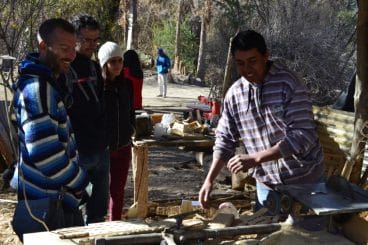
Mar 17, 2017 | Focolare Worldwide
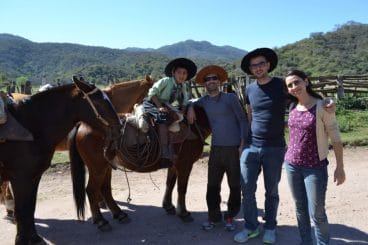 The solidarity tourism project that the Ministry of Tourism of Salta, Argentina has been promoting for six years supports small communities in the cities of Salta, Jujuy and Catamarca in the north of the country. It is enhancing the region’s natural resources in order to save the cultural richness and diversity that is linked to local history. At the same time, it offers professional training for the production of products related to the sectors of tourism, housing, transport and the sale of handicrafts and food products (jams, liqueurs, honey, and more). This has helped to avoid the migration of populations from rural areas to urban ones, preventing the increase of poverty areas in the big cities while protecting small communities that have a rich culture that is disappearing.
The solidarity tourism project that the Ministry of Tourism of Salta, Argentina has been promoting for six years supports small communities in the cities of Salta, Jujuy and Catamarca in the north of the country. It is enhancing the region’s natural resources in order to save the cultural richness and diversity that is linked to local history. At the same time, it offers professional training for the production of products related to the sectors of tourism, housing, transport and the sale of handicrafts and food products (jams, liqueurs, honey, and more). This has helped to avoid the migration of populations from rural areas to urban ones, preventing the increase of poverty areas in the big cities while protecting small communities that have a rich culture that is disappearing. 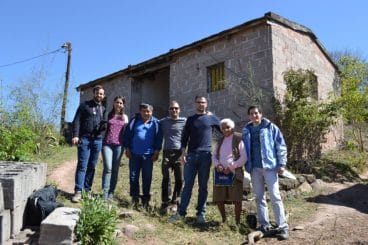 “What distinguishes this experience of development from other types of experiences,” sociologist Virginia Osorio from the Sumá Fraternidad explains, “are the words “communion” and “dialogue”. Communion, because each actor has put his or her own talents and resources in common for the development of the project; dialogue, because throughout the development process, there was strong interaction between the different components who were often in conflict with one another. Difficulties were never lacking, but the strategy used to overcome those difficulties was to work in squads and practice active listening among parties: the local community, the State, businesses and other types of civil organisations.” She went on to say: “The result of this experience has been the birth of a new product and of a new kind of consumer. It’s not the idea of tourism that we have been used to. In this experience there is the added value of contact with the rich cultural wealth of small rural communities and, in several cases, of the descendents of indigenousness peoples. This type of tourism creates encounter among people among people.”
“What distinguishes this experience of development from other types of experiences,” sociologist Virginia Osorio from the Sumá Fraternidad explains, “are the words “communion” and “dialogue”. Communion, because each actor has put his or her own talents and resources in common for the development of the project; dialogue, because throughout the development process, there was strong interaction between the different components who were often in conflict with one another. Difficulties were never lacking, but the strategy used to overcome those difficulties was to work in squads and practice active listening among parties: the local community, the State, businesses and other types of civil organisations.” She went on to say: “The result of this experience has been the birth of a new product and of a new kind of consumer. It’s not the idea of tourism that we have been used to. In this experience there is the added value of contact with the rich cultural wealth of small rural communities and, in several cases, of the descendents of indigenousness peoples. This type of tourism creates encounter among people among people.”  Stefano, a young Italian tourist who participated in the programme, reports: “I feel like for some people travelling is like looking at the world from a glass box. We travel in search of our Western standard, with our comforts, our certainties and securities. We go to “consume,” as if visiting places was like stopping to have a drink and then throwing the cup away. Many photos are taken, many souvenirs are bought, you eat at some local eatery and the game is over! A nation is not made of monuments and souvenirs, but of people that can offer hospitality, sharing their homes, their dinner tables, their music: this is the real way to travel! ‘Share’, Argentina!” The family of María José e Pablo from Argentina recount: “We liked this idea of vacation, taking walks, getting to know sites, but most of all the opportunity to meet these ‘human sites’ that at times are hidden in the background of the postcards … which allowed us to enter into the local reality of those communities. We had the strong feeling throughout this experience of breaking free from our scheme of things and filling our life with those people whom we now hold in our heart; experiencing the profound and tranquil rhythm of those places, and the scenery of many places we passed through on our trip. Now, as we return to the city, we look at daily life differently, with new eyes.”
Stefano, a young Italian tourist who participated in the programme, reports: “I feel like for some people travelling is like looking at the world from a glass box. We travel in search of our Western standard, with our comforts, our certainties and securities. We go to “consume,” as if visiting places was like stopping to have a drink and then throwing the cup away. Many photos are taken, many souvenirs are bought, you eat at some local eatery and the game is over! A nation is not made of monuments and souvenirs, but of people that can offer hospitality, sharing their homes, their dinner tables, their music: this is the real way to travel! ‘Share’, Argentina!” The family of María José e Pablo from Argentina recount: “We liked this idea of vacation, taking walks, getting to know sites, but most of all the opportunity to meet these ‘human sites’ that at times are hidden in the background of the postcards … which allowed us to enter into the local reality of those communities. We had the strong feeling throughout this experience of breaking free from our scheme of things and filling our life with those people whom we now hold in our heart; experiencing the profound and tranquil rhythm of those places, and the scenery of many places we passed through on our trip. Now, as we return to the city, we look at daily life differently, with new eyes.”
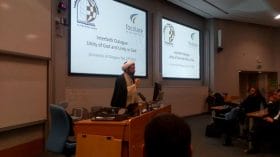
Mar 16, 2017 | Focolare Worldwide
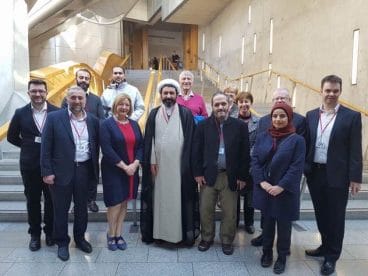 The University of Glasgow, founded in 1451, is one of Scotland’s four ancient universities. In this prestigious place, which educated seven future Nobel winners and heard Albert Einstein demonstrate his theory of relativity, the Focolare Movement and the Islamic society Ahl Al Bait organized an open lesson on interfaith dialogue and unity on 27 February. The evening was entitled “Unity in God and unity of God”. It featured a renowned figure of the Shiite world, Dr. Mohammad Ali Shomali, director of the International Institute of Islamic Studies at Qum, Iran, who currently is at the helm of the Islamic Centre of Great Britain. There was also Professor Paulo Frizzi, teacher of theology and the practice of interreligious dialogue at the Sophia University Institute at Loppiano, near Florence, Italy, where he coordinates the Sophia Global Studies research and training center. The following day, Dr Shomali was to lead a discussion before members of the Scottish Parliament.
The University of Glasgow, founded in 1451, is one of Scotland’s four ancient universities. In this prestigious place, which educated seven future Nobel winners and heard Albert Einstein demonstrate his theory of relativity, the Focolare Movement and the Islamic society Ahl Al Bait organized an open lesson on interfaith dialogue and unity on 27 February. The evening was entitled “Unity in God and unity of God”. It featured a renowned figure of the Shiite world, Dr. Mohammad Ali Shomali, director of the International Institute of Islamic Studies at Qum, Iran, who currently is at the helm of the Islamic Centre of Great Britain. There was also Professor Paulo Frizzi, teacher of theology and the practice of interreligious dialogue at the Sophia University Institute at Loppiano, near Florence, Italy, where he coordinates the Sophia Global Studies research and training center. The following day, Dr Shomali was to lead a discussion before members of the Scottish Parliament. 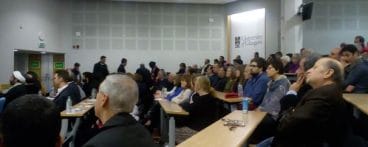 The longstanding friendship between Sophia University Institute and the Shiite academic brought about a dialogue and research project last summer that involved a group of Christian and Muslim scholars, with the suggestive title “Wings of Unity.” “I presented the methodology and atmosphere that our institute promotes, where we work with an academic approach that is integrated, where experience and application is placed alongside the theory,” explains Frizzi. “For example, a course on interreligious dialogue is taught by three of us with different academic backgrounds and experience, yet we try to develop a common program through reciprocal listening, sort of a journey of unity in which we co-teach the lessons and the students play a lead role.”
The longstanding friendship between Sophia University Institute and the Shiite academic brought about a dialogue and research project last summer that involved a group of Christian and Muslim scholars, with the suggestive title “Wings of Unity.” “I presented the methodology and atmosphere that our institute promotes, where we work with an academic approach that is integrated, where experience and application is placed alongside the theory,” explains Frizzi. “For example, a course on interreligious dialogue is taught by three of us with different academic backgrounds and experience, yet we try to develop a common program through reciprocal listening, sort of a journey of unity in which we co-teach the lessons and the students play a lead role.” 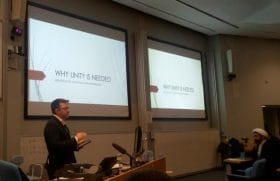 Wings of Unity, explains the Sophia professor, provides a physical space to dialogue, where on one hand students can deepen their understanding of what “unity in God and of God” means, clarifying elements of difference and those held in common. On the other, they can explore the ways in which unity can be tangibly lived, healing wounds and resolving differences. “Too often interfaith initiatives only touch on the questions of the few, without a tangible impact. This is a delicate moment we live in, and we have to take into account the transition towards an uncertain new world order, where greater interconnectivity and interdependence sit alongside painful divisions that fracture the unity of society. Globalization has probably failed in its attempt to build sustainable community, as multinational institutions fail to guarantee a safe space where cultures and religions can meet without the risk of losing themselves. “This may be true, but on the other hand there is experience, commitment and dialogue welling up that, in contrast, enriches neighborhoods and unifies communities. It begins deep down and helps us all think once again of unity amid diversity.” As Pope Francis states in Evangelii Gaudium, dialogue happens in a world that is not a pyramid (where some are at the top over many others) nor a sphere (without any distinguishable sides), but instead multifaceted, where all parts converge together while maintaining its own individuality.
Wings of Unity, explains the Sophia professor, provides a physical space to dialogue, where on one hand students can deepen their understanding of what “unity in God and of God” means, clarifying elements of difference and those held in common. On the other, they can explore the ways in which unity can be tangibly lived, healing wounds and resolving differences. “Too often interfaith initiatives only touch on the questions of the few, without a tangible impact. This is a delicate moment we live in, and we have to take into account the transition towards an uncertain new world order, where greater interconnectivity and interdependence sit alongside painful divisions that fracture the unity of society. Globalization has probably failed in its attempt to build sustainable community, as multinational institutions fail to guarantee a safe space where cultures and religions can meet without the risk of losing themselves. “This may be true, but on the other hand there is experience, commitment and dialogue welling up that, in contrast, enriches neighborhoods and unifies communities. It begins deep down and helps us all think once again of unity amid diversity.” As Pope Francis states in Evangelii Gaudium, dialogue happens in a world that is not a pyramid (where some are at the top over many others) nor a sphere (without any distinguishable sides), but instead multifaceted, where all parts converge together while maintaining its own individuality.  Dr Shomali intervenes with some words about identity: “If we reflect on how religions developed, we realize that one question has always been present: How can we keep people together, convincing them that, if we stay in the circle, we are better off?” The concept of identity caused us to distance ourselves from each other, in as much as we expressed not “who we are,” but rather “who we are not” – a model of identity based on fear and exclusion. If it ever worked in the past, it was because the world was quite segmented, without great opportunities to meet as people of different faiths, ethnic groups or cultures. This is no longer the case in a world in which identity is more fragile and nuanced. Because of this, holds the Shiite scholar: “We need a new understanding based on what we can offer and what we can appreciate in others. To relate is essential. I cannot be a good Muslim or Christian – or a good Iranian or Scot – if I don’t know how to relate with others and include them in my identity.” The very concept of identity, therefore, needs a rethink. “The human body has different organs, each with its own function. None of these, moreover, survives on its own.” He concluded: “When I read the Quran, I see that this is God’s plan. In his creation and revelation, God showed us the way toward unity.”
Dr Shomali intervenes with some words about identity: “If we reflect on how religions developed, we realize that one question has always been present: How can we keep people together, convincing them that, if we stay in the circle, we are better off?” The concept of identity caused us to distance ourselves from each other, in as much as we expressed not “who we are,” but rather “who we are not” – a model of identity based on fear and exclusion. If it ever worked in the past, it was because the world was quite segmented, without great opportunities to meet as people of different faiths, ethnic groups or cultures. This is no longer the case in a world in which identity is more fragile and nuanced. Because of this, holds the Shiite scholar: “We need a new understanding based on what we can offer and what we can appreciate in others. To relate is essential. I cannot be a good Muslim or Christian – or a good Iranian or Scot – if I don’t know how to relate with others and include them in my identity.” The very concept of identity, therefore, needs a rethink. “The human body has different organs, each with its own function. None of these, moreover, survives on its own.” He concluded: “When I read the Quran, I see that this is God’s plan. In his creation and revelation, God showed us the way toward unity.”
https://vimeo.com/207664744 https://vimeo.com/207664387
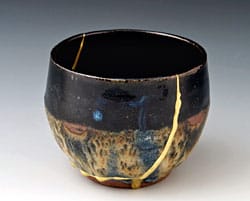
Feb 28, 2017 | Focolare Worldwide
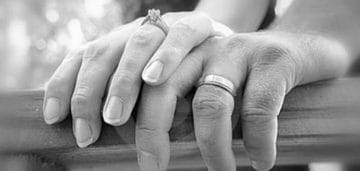 Federico: An Italian and Uruguayan: what are the chances? Yet we happened to meet, seven years ago, at a Latin American center in Rome. I was there to give a hand running things, she to speak her language a bit. Our eyes met and we started to build a home together. Economic constraints, however, pushed us to leave the big city for my parents’ small village, especially because one of our greatest wishes was about to come true: our son was on the way. There was much happiness, but the stress of the birth and the rapid life changes didn’t give us any time to breathe. Laura: As if that were not enough, my mother, who was taking care of my invalid father and my little brother, became seriously ill. I needed to immediately go to Uruguay for at least a couple of months, especially because time was running out for my mother to get to know our little one. In the meantime, Federico and I were living on two different planets: me shut in at home with the child, he always out to escape the tension between us. Whenever our eyes met there was only anger, exhaustion, misunderstanding. As I left I told him, “When I come back, we’re either going to break up or stay together forever.” Federico: Our hearts became as distant as the physical separation. The months flew by, she didn’t return, and I found myself on a different path. To be honest with her, I felt I had to tell her that I didn’t want to get back together and that perhaps she should stay there where she was. Laura: It hurt a lot, even though I expected it. I gathered my strength, put aside my suffering and decided to return to Italy, knowing that I had little chance. In fact, when I got back home, he didn’t want to hear anything about living with me. Federico: One day I confided to my brother what was happening, and he told me about a couple that had a lot of experience who could help us. The idea didn’t seem that convincing at all, but in the end, for the good of the child, I accepted. “Perhaps they can help us separate without touching off a war,” I said to myself. It was an afternoon at the end of May. In the garden where we met, the cherries were ripe, and everything spoke of hope and peace. Yet in our hearts opposing feelings were rebelling. The man’s strong handshake and the delicate face of his wife gave me shivers along my spine. I saw that Laura, too, was moved. We talked with them for a half-hour. That night I left behind everything and returned home. As I entered, tears ran down my face, but my soul seemed to fly. Maybe I could do this!
Federico: An Italian and Uruguayan: what are the chances? Yet we happened to meet, seven years ago, at a Latin American center in Rome. I was there to give a hand running things, she to speak her language a bit. Our eyes met and we started to build a home together. Economic constraints, however, pushed us to leave the big city for my parents’ small village, especially because one of our greatest wishes was about to come true: our son was on the way. There was much happiness, but the stress of the birth and the rapid life changes didn’t give us any time to breathe. Laura: As if that were not enough, my mother, who was taking care of my invalid father and my little brother, became seriously ill. I needed to immediately go to Uruguay for at least a couple of months, especially because time was running out for my mother to get to know our little one. In the meantime, Federico and I were living on two different planets: me shut in at home with the child, he always out to escape the tension between us. Whenever our eyes met there was only anger, exhaustion, misunderstanding. As I left I told him, “When I come back, we’re either going to break up or stay together forever.” Federico: Our hearts became as distant as the physical separation. The months flew by, she didn’t return, and I found myself on a different path. To be honest with her, I felt I had to tell her that I didn’t want to get back together and that perhaps she should stay there where she was. Laura: It hurt a lot, even though I expected it. I gathered my strength, put aside my suffering and decided to return to Italy, knowing that I had little chance. In fact, when I got back home, he didn’t want to hear anything about living with me. Federico: One day I confided to my brother what was happening, and he told me about a couple that had a lot of experience who could help us. The idea didn’t seem that convincing at all, but in the end, for the good of the child, I accepted. “Perhaps they can help us separate without touching off a war,” I said to myself. It was an afternoon at the end of May. In the garden where we met, the cherries were ripe, and everything spoke of hope and peace. Yet in our hearts opposing feelings were rebelling. The man’s strong handshake and the delicate face of his wife gave me shivers along my spine. I saw that Laura, too, was moved. We talked with them for a half-hour. That night I left behind everything and returned home. As I entered, tears ran down my face, but my soul seemed to fly. Maybe I could do this!  Laura: When I saw Federico come back I couldn’t believe it. Our next appointment with that couple was at Loppiano (near Florence), where we met other friends of theirs, couples who were having difficulties like us. But the change in us had already begun. At the course organized by New Families of the Focolare Movement, the first thing they talked to us about – almost like a game – was the Japanese art of kintsugi, where a broken ceramic vase is not thrown away, but glued together with gold. Doing so, it becomes even more valuable. The new atmosphere we were breathing in there was renewing us without us realizing it. We understood that forgiveness was the gold that could put us together again, and we asked it of each other. We found the strength to give of ourselves to each other. Federico: It was a mix of the spirituality of unity, which the course was based on; advice from experts; and the support from the other couples that strengthened our desire to be reborn again as a couple and gave us a fundamental push to change. Ever since, each day we tell each other that we’re ready to start again, without taking anything for granted and making the effort to step in each other’s shoes. Laura: After two years we got to the point where we were able to make an important decision: to get married in Church, so that Love par excellence could watch over our life together and continue flowing forever. Now we are expecting our second child in July. Truly the love of God knew how to write straight on our crooked lines!
Laura: When I saw Federico come back I couldn’t believe it. Our next appointment with that couple was at Loppiano (near Florence), where we met other friends of theirs, couples who were having difficulties like us. But the change in us had already begun. At the course organized by New Families of the Focolare Movement, the first thing they talked to us about – almost like a game – was the Japanese art of kintsugi, where a broken ceramic vase is not thrown away, but glued together with gold. Doing so, it becomes even more valuable. The new atmosphere we were breathing in there was renewing us without us realizing it. We understood that forgiveness was the gold that could put us together again, and we asked it of each other. We found the strength to give of ourselves to each other. Federico: It was a mix of the spirituality of unity, which the course was based on; advice from experts; and the support from the other couples that strengthened our desire to be reborn again as a couple and gave us a fundamental push to change. Ever since, each day we tell each other that we’re ready to start again, without taking anything for granted and making the effort to step in each other’s shoes. Laura: After two years we got to the point where we were able to make an important decision: to get married in Church, so that Love par excellence could watch over our life together and continue flowing forever. Now we are expecting our second child in July. Truly the love of God knew how to write straight on our crooked lines!

 What Europe should be United Europe is another step towards a united world. It is a step forward and an achievement under the pressure of popular requests, natural rights, Christian revelation, moral and spiritual forces, with the addition of economic and political, and scientific and technological pressure. All these propel towards unification, the final evolution of reason and morals, of life in time and in eternity. For Clement of Alexandria – heir of Greek wisdom – unity is the good, and producer of life; division is the evil and generator of death. Civilisation grows proportionately with how much it unifies people. For Huxley, every new progress of civilisation is a progress in charity, which is the sentiment which tends to make everyone one. It is no wonder since it is the soul of Christ whose testament ended in the vow: «so that all may be one.» Charity leads to integration, communion, and solidarity, also in politics and economy. And here, between the essential forces that press toward European integration, we want to illustrate the forces of the spirit, leaving it to illustrate the political, economic, and social aspects, etc. Igino Giordani, «Fides», May 1961, p.130 Christianity and Europe Europe is full of resentment like a storage of explosives, kept alive by philosophies and false patriotisms, mythologies and egoistic interests. In order not to explode, Europe needs to remove all this inflammable material. It needs a universal reconcilement, which could free it from the past so it could look to the future. Whoever will carry out «this ministry of reconciliation?» It is Christianity: this well of sanctity, which Europe still guards and still communicates to other continents. And Christianity implies a unification in freedom and peace, with the elimination of wars and other reasons for friction. Igino Giordani, «Fides», May 1961, p.131 The soul of Europe Europe already has a soul: Christianity, its essence and its genesis. In this common spiritual breath, also the material and human factors blend and arise, vivifying themselves with a universal ideal. And so the peoples of Europe, upon reviving these principles at the base of their history, melting them in the ideal flame of solidarity, the fruit of love – which is divine intelligence – will find in its rationality, coexistence, urgency and need of it, the solution, firstly to their problems. This is the a decisive moment, in which an internal war – which today more than ever before, appears irrational and fratricide – could mark the definitive catastrophe. Love instead, putting the good in circulation, will be able mark the final salvation. Igino Giordani, «Fides», May 1961, p.131
What Europe should be United Europe is another step towards a united world. It is a step forward and an achievement under the pressure of popular requests, natural rights, Christian revelation, moral and spiritual forces, with the addition of economic and political, and scientific and technological pressure. All these propel towards unification, the final evolution of reason and morals, of life in time and in eternity. For Clement of Alexandria – heir of Greek wisdom – unity is the good, and producer of life; division is the evil and generator of death. Civilisation grows proportionately with how much it unifies people. For Huxley, every new progress of civilisation is a progress in charity, which is the sentiment which tends to make everyone one. It is no wonder since it is the soul of Christ whose testament ended in the vow: «so that all may be one.» Charity leads to integration, communion, and solidarity, also in politics and economy. And here, between the essential forces that press toward European integration, we want to illustrate the forces of the spirit, leaving it to illustrate the political, economic, and social aspects, etc. Igino Giordani, «Fides», May 1961, p.130 Christianity and Europe Europe is full of resentment like a storage of explosives, kept alive by philosophies and false patriotisms, mythologies and egoistic interests. In order not to explode, Europe needs to remove all this inflammable material. It needs a universal reconcilement, which could free it from the past so it could look to the future. Whoever will carry out «this ministry of reconciliation?» It is Christianity: this well of sanctity, which Europe still guards and still communicates to other continents. And Christianity implies a unification in freedom and peace, with the elimination of wars and other reasons for friction. Igino Giordani, «Fides», May 1961, p.131 The soul of Europe Europe already has a soul: Christianity, its essence and its genesis. In this common spiritual breath, also the material and human factors blend and arise, vivifying themselves with a universal ideal. And so the peoples of Europe, upon reviving these principles at the base of their history, melting them in the ideal flame of solidarity, the fruit of love – which is divine intelligence – will find in its rationality, coexistence, urgency and need of it, the solution, firstly to their problems. This is the a decisive moment, in which an internal war – which today more than ever before, appears irrational and fratricide – could mark the definitive catastrophe. Love instead, putting the good in circulation, will be able mark the final salvation. Igino Giordani, «Fides», May 1961, p.131

 As a child, he dreamt of being a pilot, but an attraction to the priesthood stuck with him from the time he was eleven. He was born on May 17, 1932 in Lisnice, the Province of Pisek in Southern Bohemia. From 1952 to 1953 he was a worker. In 1960, following his graduation, he worked as an archivist but soon abandoned that occupation to study theology. In 1968 he was ordained to the priesthood. During a visit to East Germany in the 1960s, he met a layman and some priests who were living the
As a child, he dreamt of being a pilot, but an attraction to the priesthood stuck with him from the time he was eleven. He was born on May 17, 1932 in Lisnice, the Province of Pisek in Southern Bohemia. From 1952 to 1953 he was a worker. In 1960, following his graduation, he worked as an archivist but soon abandoned that occupation to study theology. In 1968 he was ordained to the priesthood. During a visit to East Germany in the 1960s, he met a layman and some priests who were living the 










 Federico: An Italian and Uruguayan: what are the chances? Yet we happened to meet, seven years ago, at a Latin American center in Rome. I was there to give a hand running things, she to speak her language a bit. Our eyes met and we started to build a home together. Economic constraints, however, pushed us to leave the big city for my parents’ small village, especially because one of our greatest wishes was about to come true: our son was on the way. There was much happiness, but the stress of the birth and the rapid life changes didn’t give us any time to breathe. Laura: As if that were not enough, my mother, who was taking care of my invalid father and my little brother, became seriously ill. I needed to immediately go to
Federico: An Italian and Uruguayan: what are the chances? Yet we happened to meet, seven years ago, at a Latin American center in Rome. I was there to give a hand running things, she to speak her language a bit. Our eyes met and we started to build a home together. Economic constraints, however, pushed us to leave the big city for my parents’ small village, especially because one of our greatest wishes was about to come true: our son was on the way. There was much happiness, but the stress of the birth and the rapid life changes didn’t give us any time to breathe. Laura: As if that were not enough, my mother, who was taking care of my invalid father and my little brother, became seriously ill. I needed to immediately go to